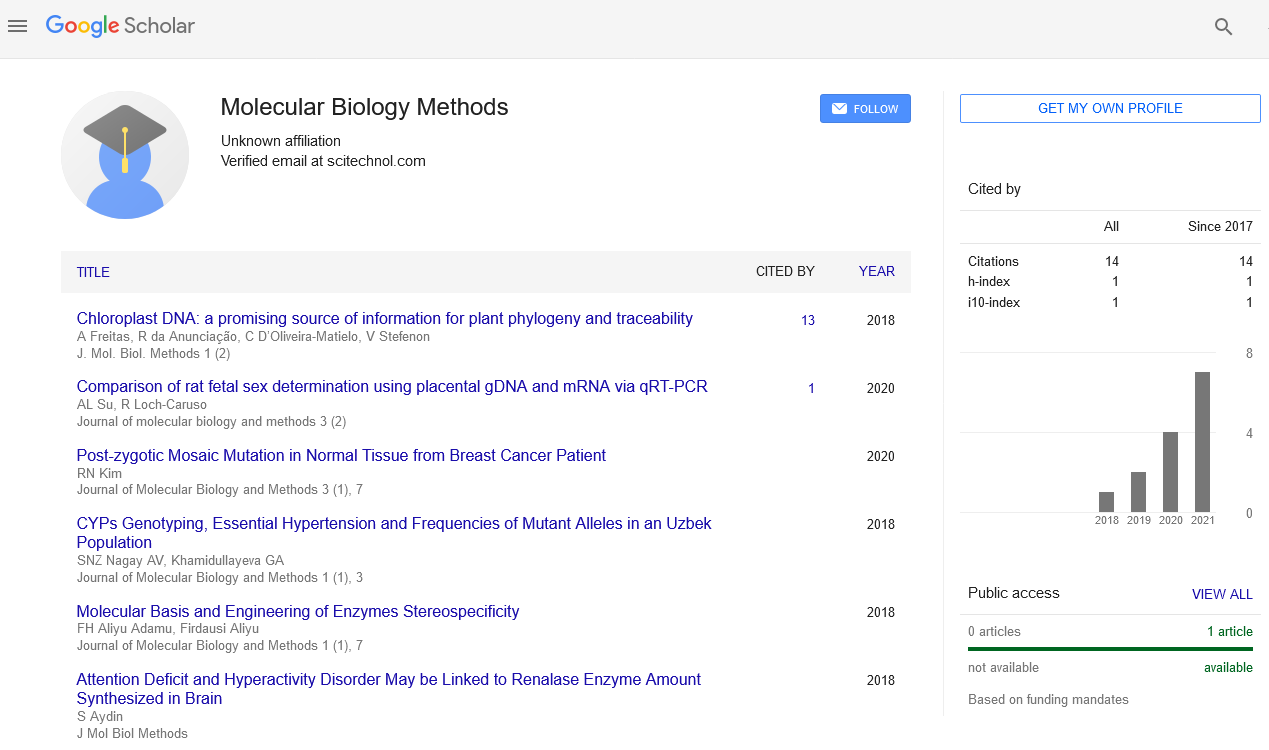Perspective, J Mol Biol Methods Vol: 7 Issue: 2
An Overview on Epigenetics: Mechanisms and Processes
Jiye Kim*
1Department of Biological Engineering, Konkuk University, Seoul, Republic of Korea
*Corresponding Author: Jiye Kim,
Department of Biological Engineering, Konkuk
University, Seoul, Republic of Korea
E-mail: kimjiye@ac.kr
Received date: 28 May, 2024, Manuscript No. JMBM-24-140279;
Editor assigned date: 31 May, 2024, PreQC No. JMBM-24-140279 (PQ);
Reviewed date: 14 June, 2024, QC No. JMBM-24-140279;
Revised date: 21 June, 2024, Manuscript No. JMBM-24-140279 (R);
Published date: 38 June, 2024 DOI: 10.4172/JMBM.1000163
Citation: Kim J (2024) An Overview on Epigenetics: Mechanisms and Processes. J Mol Biol Methods 7:2.
Description
Epigenetics, once a niche field, has emerged as a pivotal area of study in understanding how genes are expressed without altering the underlying DNA sequence. It encompasses the intricate regulatory mechanisms that influence gene activity, revealing a dynamic interplay between genetics and the environment.
At its core, epigenetics refers to heritable changes in gene expression that occur without changes to the DNA sequence itself. These changes are important in determining which genes are active or silent in different cells at different times, influencing various biological processes such as development, aging, and disease susceptibility.
Epigenetic mechanisms
There are several key mechanisms through which epigenetic modifications operate:
DNA methylation: This involves the addition of methyl groups to DNA molecules, typically at cytosine bases within CpG dinucleotides. Methylation patterns can influence gene expression by affecting the binding of transcription factors and other proteins to DNA, thereby altering chromatin structure and gene accessibility.
Histone modifications: Histones are proteins around which DNA is wrapped, forming chromatin. Modifications such as methylation, acetylation, phosphorylation, and ubiquitination of histone tails can alter chromatin structure, making genes more or less accessible for transcription.
Non-coding RNAs (ncRNAs): These RNA molecules do not encode proteins but play critical roles in regulating gene expression. Examples include microRNAs (miRNAs) and long non-coding RNAs (lncRNAs), which can interfere with mRNA stability or translation, influencing protein production.
Environmental factors such as diet, stress, exposure to pollutants, and lifestyle choices can profoundly impact epigenetic patterns. These influences can be transient or persist across generations, shaping health outcomes and disease susceptibility in populations.
The role of epigenetics in development is profound, orchestrating the differentiation of cells into specialized tissues and organs. Disruptions in epigenetic regulation can lead to developmental disorders and contribute to the pathogenesis of various diseases, including cancer, metabolic disorders, and neurological conditions.
Epigenetics and disease susceptibility
Cancer: Aberrant DNA methylation patterns and histone modifications are common in cancer cells, altering the expression of genes involved in cell growth, differentiation, and apoptosis. Epigenetic changes can contribute to tumor initiation, progression, and response to treatment.
Neurological Disorders: Epigenetic mechanisms play a crucial role in brain development and function. Deregulation of epigenetic processes has been implicated in neurodevelopmental disorders such as autism spectrum disorders and intellectual disabilities, as well as neurodegenerative diseases like Alzheimer's and Parkinson's disease.
Metabolic Disorders: Epigenetic modifications can influence metabolic pathways, affecting glucose and lipid metabolism. These changes may contribute to the development of obesity, type 2 diabetes, and cardiovascular disease.
Recent research suggests that epigenetic modifications can be inherited across generations, challenging the traditional view of genetics as solely DNA-based. Environmental exposures experienced by one generation may influence the epigenetic profiles of subsequent generations, potentially impacting health outcomes and disease risk.
Understanding epigenetic mechanisms opens new avenues for therapeutic interventions and personalized medicine. Epigenetic markers can serve as diagnostic and prognostic indicators for diseases, guiding targeted treatments that account for individual variations in gene expression and environmental exposures.
The study of epigenetics raises ethical considerations regarding the implications of environmental exposures on future generations and the potential for epigenetic modifications to be manipulated for therapeutic or enhancement purposes. It underscores the importance of responsible research practices and informed public discourse on the ethical implications of epigenetic discoveries.
 Spanish
Spanish  Chinese
Chinese  Russian
Russian  German
German  French
French  Japanese
Japanese  Portuguese
Portuguese  Hindi
Hindi 